October 9, 2012
Edited by David Sanders
Specimen Days
October 9, 2012
1586 – Jan III van Foreest, lawyer/poet/mayor of Hoorn, is born.
1892 – Marina Tsvetaeva, Russian poet (d. 1941), is born.
1906 – Léopold Sédar Senghor, Senegalese poet and politician (d. 2001), is born.
1908 – Harry Hooton, Australian poet (d. 1961), is born.
1915 – Constant A M Cap, Flemish poet/etcher, dies at 73.
1920 – Jens Bjorneboe, Norway, poet/writer (Dikt, Jonas), is born.
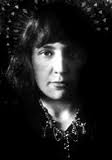 A kiss on the forehead—erases misery.
A kiss on the forehead—erases misery.
I kiss your forehead.
A kiss on the eyes—lifts sleeplessness.
I kiss your eyes.
A kiss on the lips—is a drink of water.
I kiss your lips.
A kiss on the forehead—erases memory.
—Marina Tsvetaeva, 1917
Poetry In The News
Lemon Andersen, A Puerto Rican Who Uses Poetry to Turn His Life Around

Lemon Andersen, a three-time felon, had a tough upbringing on the streets of Brooklyn. He became an orphan as a teen when he lost his Puerto Rican mother and Norwegian American father to drugs and AIDS. To get by, he became involved with gangs and started selling drugs. That way of life got him booked into jail where he began reading and educating himself about poetry. Read more at VOXXI.
Divided by a Common Verse: Jorie Graham Wins the Forward Poetry Prize
The prestigious British Forward poetry prize just announced that American Jorie Graham won. Judge Emma Hogan on what her victory tells us about the different verse styles of the U.S. and Britain. Read more at The Daily Beast.
World Poetry
Acclaimed Vietnamese Dissident Poet Dies in Little Saigon

English PEN’s Writers at Risk Programme are delighted to be supporting “Poems for Pussy Riot,” an exciting new project, initiated by writer and editor Sophie Mayer. In this guest blog, Sophie explains the genesis of the project, and why everyone can and should get involved. Read more at English Pen.
New Books
Red Army Red: Poems by Jehanne Dubrow
[Paperback] Triquarterly, 84 pp., $16.95
Displaying a sure sense of craft and a sharp facility for linking personal experience to the public realms of history and politics, Jehanne Dubrow’s Red Army Red chronicles the coming of age of a child of American diplomats in Eastern Europe in the 1980s. In the last moments of the Cold War, Poland—the setting for many of the poems—lurches fitfully from a society characterized by hardship and deprivation toward a free-market economy. The contradictions and turmoil generated by this transition are the context in which an adolescent girl awakens to her sexuality. With wit and subtlety, Dubrow makes apparent the parallels between the body and the body politic, between the fulfillment of individual and collective desires.
Diadem: Selected Poems by Marosa di Giorgio
[Paperback] BOA Editions Ltd., 80 pp., $16.00
Marosa di Giorgio has one of the most distinct and recognizable voices in Latin American poetry. Her surreal and fable-like prose poems invite comparison to Franz Kafka, Julio Cortázar, or even contemporary American poets Russell Edson and Charles Simic. But di Giorgio’s voice, imagery, and themes—childhood, the Uruguayan countryside, a perception of the sacred—are her own. Previously written off as “the mad woman of Uruguayan letters,” di Giorgio’s reputation has blossomed in recent years. Translator Adam Giannelli’s careful selection of poems spans the enormous output of di Giorgio’s career to help further introduce English-language readers to this vibrant and original voice.
A Thousand Mornings by Mary Oliver
[Hardcover] Penguin Press, 96 pp., $24.95
In A Thousand Mornings, Mary Oliver returns to the imagery that has come to define her life’s work, transporting us to the marshland and coastline of her beloved home, Provincetown, Massachusetts. In these pages, Oliver shares the wonder of dawn, the grace of animals, and the transformative power of attention. Whether studying the leaves of a tree or mourning her adored dog, Percy, she is ever patient in her observations and open to the teachings contained in the smallest of moments.
No Hurry: Poems 2000-2012 by Michael Blumenthal
[Paperback] Etruscan Press, 125 pp., $16.00
“Michael Blumenthal’s poetry never sits heavy on the reader yet is substantial, civilized, and capable of articulating the human condition, including its pains and losses, without melodrama, high sentence, or self-pity. No Hurry is a gorgeous book: the world of flesh, mind, and heart spoken through air and silk.”—George Szirtes
Recent Reviews
Warts and All
by N. Bryant Kirkland
What would Martial, the prolific dispenser of the pungent epigram, have done with Western culture in the 21st century? His readers across the millennia have probably asked the same question about their own times—and perhaps wiped their brows that they were spared his stylus, that unerring dart aimed at all the follies, hypocrisies, and unpleasant lunacies that a society necessarily produces and thus, with almost equal necessity, avoids talking about. Who really wants to have the following zinger uncorked at his funeral? Read more at Agenda Poetry.
Unexpected Love Poems
by Mike Pride
Divorce after a long marriage usually leaves at least one former spouse bitter and angry. The pain of betrayal blots out all else. Knowing, as I did for years, that Sharon Olds was working on a collection of poems about the breakup of her 30-year marriage, I winced when the book showed up in my mail. Read more at the Concord Monitor.
The Wheat and the Chaff

Lucille Clifton is the rare poet good enough to survive the Collected Poems treatment.
By Jonathan Farmer
When we want to celebrate a poet, we ring the bells and release all her poems under one cover, rolling out the Collected Poems, ideally in time for the holidays. It’s an awkward gesture, half hagiography, half entombment, creating a memorial that’s impossible for all but the devoted to read. Read more at Slate.
A Hazard of New Fortunes: On Bernstein’s “Attack of the Difficult Poems”
by Joshua Weiner
Within the camera frame we see a block of text the size of the Empire State Building smashing its way through lower Manhattan. A writhing tangle of poetic lines reaches out and grabs a pedestrian reader, lances a billboard, and masticates a movie theater playing MI3: Ghost Protocol. A member of the graduate faculty averse to dealing with texts she can’t explicate, contextualize, psychoanalyze, or deconstruct runs into the frame, turns to the camera, and gives a piercing scream. It’s the Attack of the Difficult Poems! Read more at the LA Review of Books.
Correspondences
Don Share Previews Poetry Foundation’s New Anthology
by Geoffrey Johnson
In October 1912, Harriet Monroe, a 51-year-old Chicagoan, published the first issue of Poetry: A Magazine of Verse. In October 2012, that audacious journal still thrives, and to commemorate its centennial, Christian Wiman and Don Share, its editor and senior editor, have assembled an anthology of its verse and prose: The Open Door: One Hundred Poems, One Hundred Years of Poetry Magazine. (The book takes its title from Monroe’s 1912 manifesto, which kicks off the collection: “The Open Door will be the policy of this magazine—may the great poet we are looking for never find it shut, or half-shut, against his ample genius!”) Wiman and Share will host a Poetry centennial celebration and release party for The Open Door at this Thursday at the Poetry Foundation. Share recently discussed how the collection was assembled, who made the cut—and who didn’t—and the lingering presence of Harriet Monroe, the magazine’s founder. Read more at Chicago Magazine.
The Poet on the Poem: Matthew Thorburn
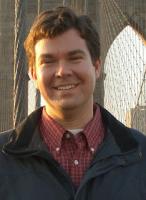
by Diane Lockwood
Matthew Thorburn is the author of two books of poems, Every Possible Blue (CW Books, 2012) and Subject to Change (New Issues, 2004). A third collection, This Time Tomorrow, is scheduled for release from Waywiser Press in 2013. He is the recipient of a Witter Bynner Fellowship from the Library of Congress, the Mississippi Review Prize, and two Dorothy Sargent Rosenberg Poetry Prizes. His poems have appeared in literary journals such as The Paris Review, American Poetry Review, Poetry, and Prairie Schooner. A native of Michigan, Matt has lived in New York City for more than a decade. Today’s poem comes from Every Possible Blue. Read more at Blogalicious.
Broadsides
What Mitt Romney Might Learn from Wallace Stevens
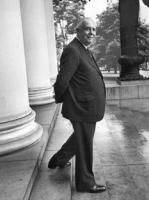
by Michelle Dean
Poets and politicians are thought to have different temperaments, but it is possible that in another life Wallace Stevens could have traded professions. Just like a certain businessman-turned-candidate for President, Stevens was the kind of person who wore a three-piece suit every day, even on weekends, even on the long, reflective walks he took to compose his poems. People who saw him going along the country roads near Hartford, if they noticed him at all, must have thought, “There goes a boring rich man.” Read more at the New Yorker.
Drafts & Fragments
Artist Hides Fragments of Painted Poem in Bookstores
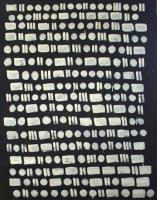
By Jason Boog
Los Angeles artist ETMCA painted a coded 20-line poem called “The Ones” across ten large canvases. The artist cut some of these paintings into pieces and hid the fragments in Los Angeles used bookstores so readers can discover his “message art” in the real world. Read more at GalleyCat.
Poetry Prescriptions: Verse to Cure All Ills
On National Poetry Day, poetry evangelist William Sieghart will be coming online to solve your predicaments with a well-chosen verse. Got a problem? Tell us about it below, and come back on Thursday to take your poetry medicine. Read more at the Guardian.
Envoi: Editor’s Notes
Keats’ Death Possibly Due to Mother’s Heavy Drinking
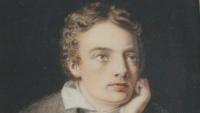
A new biography claims the tragic death of poet John Keats at the age of just 25 may have been due to his mother’s heavy drinking. Daily Mail reports the author has drawn on new medical evidence to suggest Keats may have suffered from fetal alcohol syndrome. Read more at NewsTalk ZB.
Fetal Alcohol Syndrome would have made Keats more susceptible to the tuberculosis that he contracted from his brother Tom whom he cared for in the year leading up to Tom’s death. Another article published yesterday in the Independent reporting on the same new biography claims that he died from taking mercury to treat his TB. Two weeks ago, we learned that he became addicted to opium (in the form of laudanum) to relieve the pain of TB; the addiction likely hastened his death. As did the mercury, as did the FAS, as did the bleeding performed on him by the doctors in Italy, as did the tuberculous (in 1815, 1 in 4 deaths in England was caused by TB). As young as he was when he died, it’s remarkable—if this is all true—that he lasted as long as he did, let alone have the energy and presence of mind to write as brilliantly as he did.
—David Sanders